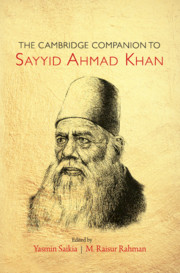Book contents
- Frontmatter
- Contents
- List of Figures
- Notes on Contributors
- Acknowledgements
- A Note on Spellings and Transliteration
- Chronology of Sayyid Ahmad Khan
- Introduction
- Part I Sayyid Ahmad Khan: The rise of a historical figure
- Part II Musalman-e Hind: Indian Muslim in a plural environment
- Part III Sir Sayyid today: Enduring legacies
- Conclusion
- Suggested Further Readings
- Index
Conclusion
Published online by Cambridge University Press: 26 April 2019
- Frontmatter
- Contents
- List of Figures
- Notes on Contributors
- Acknowledgements
- A Note on Spellings and Transliteration
- Chronology of Sayyid Ahmad Khan
- Introduction
- Part I Sayyid Ahmad Khan: The rise of a historical figure
- Part II Musalman-e Hind: Indian Muslim in a plural environment
- Part III Sir Sayyid today: Enduring legacies
- Conclusion
- Suggested Further Readings
- Index
Summary
‘I aged before my age, I lost my hair, my eyesight, but not my vision. My vision never dimmed, my determination never failed. I built this institution for you and I am sure you will carry the light of this institution far and wide till darkness disappears from all around.’ These last words of Sayyid Ahmad Khan to the students of the Muhammadan Anglo-Oriental (MAO) College – now Aligarh Muslim University (AMU) – are enshrined at an entrance of the university, reminding the obligation to expand the realm of knowledge within and outside the institution. Sayyid Ahmad feared that without knowledge, a community would remain steeped in ignorance and denial. He urged Indians – Muslims and Hindus alike – to embark on the journey of modern education to stop their fall into the abyss of poverty. His pioneering thoughts, ideas, and actions in the field of education, cultural awakening, and social reform produced immediate and positive result during his lifetime, and their overall impact reverberates even today in the India–Pakistan subcontinent. Indeed, this is a rare legacy that the memory of a person can transcend the divides of the South Asian nation-states and bring people together in his memory. Sayyid Ahmad is this figure of unity.
Sayyid Ahmad's name is synonymous with modern Muslim education. His embrace of Western secular learning coupled with the adoption of English language arguably was the most powerful and radical model for Muslim education in nineteenth century India. No one before him had ventured in this direction, in spirit or in magnitude. It was a path plagued with obstacles. Muslim and Hindu opponents attacked, opposed, and reviled him. Despite severe criticisms, he pursued his dream of introducing modern, secular education and founded the MAO College at Aligarh. The benefits of modern education have reached a much larger community, larger than the network of alumni and students of AMU, the Aligs. It embraces everyone – be it Muslims or non-Muslims, Aligs or non-Aligs – who incorporates balanced scientific approach and rational thought with an awareness of religion and cultural practices. Sayyid Ahmad's life and his ideas depict a unique blend of tradition and modernity, rooted in Indian culture with the flexibility to adopt and adapt with Anglo-western culture.
- Type
- Chapter
- Information
- The Cambridge Companion to Sayyid Ahmad Khan , pp. 273 - 280Publisher: Cambridge University PressPrint publication year: 2019

